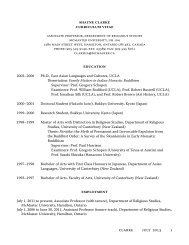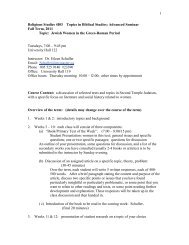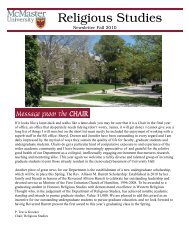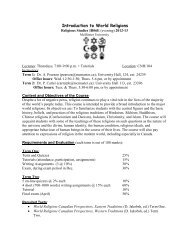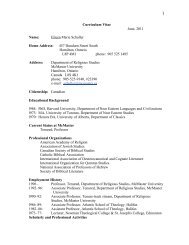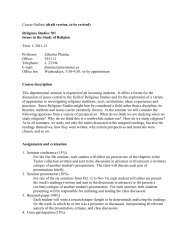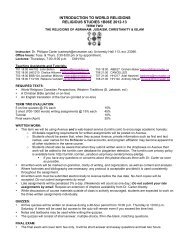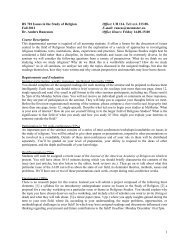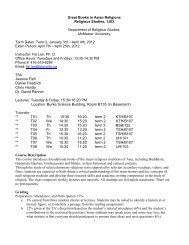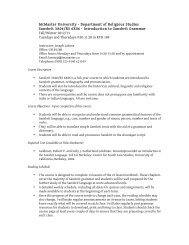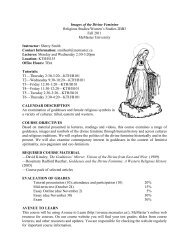Religious Studies 2YY3E Bible and Film Department of Religious ...
Religious Studies 2YY3E Bible and Film Department of Religious ...
Religious Studies 2YY3E Bible and Film Department of Religious ...
Create successful ePaper yourself
Turn your PDF publications into a flip-book with our unique Google optimized e-Paper software.
<strong>Religious</strong> <strong>Studies</strong> <strong>2YY3E</strong><strong>Bible</strong> <strong>and</strong> <strong>Film</strong><strong>Department</strong> <strong>of</strong> <strong>Religious</strong> <strong>Studies</strong>McMaster UniversityWinter Term, 2013-2014Class Location <strong>and</strong> Time: Monday, 7-10 pm, Location TBDTeaching Staff: Dr. Jonathan Bernier (Instructor), TAsContact Info: berniejt@mcmaster.caOffice Hours: 4:30-5:30 pm, Tuesday, or by appointmentOffice: University Hall B122Course DescriptionThis course will survey several films that each addresses the biblical theme <strong>of</strong> the saviour figure. Wewill consider how filmmakers can employ this theme towards a variety <strong>of</strong> cinematic, social, <strong>and</strong> politicalends.Course ObjectivesBy the end <strong>of</strong> the course, students should be able to, discuss how film-makers adapt Biblical stories <strong>and</strong> appropriate Biblical themes; discuss how, in so doing, film-makers <strong>of</strong>ten comment upon our world; discuss how the same story or theme can be adapted or appropriated towards a variety <strong>of</strong> ends.Required Course MaterialsA <strong>Bible</strong>, preferably the New Revised St<strong>and</strong>ard Version.Richard Walsh. Reading the Gospels in the Dark: Portrayals <strong>of</strong> Jesus in <strong>Film</strong>. Harrisburg, Pa.: TrinityPress International, 2003. [Available in The Campus Store].The Ten Comm<strong>and</strong>ments (1956). Note: there have been several films bearing this title. If it does not starCharlton Heston as Moses <strong>and</strong> Yul Brynner as Ramesses, then you are watching the wrong one.The Prince <strong>of</strong> Egypt (1999). Note: yes, the animated film by Dreamworks.Class StructureWith the notable exception <strong>of</strong> the evenings upon which students write in-class writing assignments, classsessions will ordinarily begin by viewing a film, followed by a brief break, after which we will as agroup discuss the film. Students are advised not to consider it sufficient to either view the films at homein lieu <strong>of</strong> attending class, or to leave at break.Methods <strong>of</strong> EvaluationFirst Short Essay—20%. Due 11:59 pm, February 22 nd .Second Short Essay—25%. Due 11:59 pm, March 22 nd .First In-class Writing Assignment—15%. February 4 th .Second In-class Writing Assignment—15%. March 11 th .Final Examination—25%. Time <strong>and</strong> location TBD.
Short Essay AssignmentsStudents are asked to submit two short essay assignments, due on February 22 nd <strong>and</strong> March 22 ndrespectively. The guidelines are given below, <strong>and</strong> students are always welcome <strong>and</strong> indeed encouragedto bring any concerns regarding the assignments to members <strong>of</strong> the teaching staff.First Short Essay Assignment: Having viewed The Ten Comm<strong>and</strong>ments (1956) <strong>and</strong> read the book <strong>of</strong>Exodus, select an issue such as (but not limited to) gender, race, or ideology. Discuss how thefilm h<strong>and</strong>les the selected issue. DUE: 11:59 pm, February 22 nd .Second Short Essay Assignment: Having viewed The Prince <strong>of</strong> Egypt (1999), discuss how the filmh<strong>and</strong>les same issue discussed in the first assignment. DUE: 11:59 pm, March 22 nd .Format Guidelines: Short Essay Assignments should be four to five pages in length, double-spaced with1” margins, written in 12 pt., Times New Roman or Times Roman font. Academically acceptableuse <strong>of</strong> the English language is expected as a matter <strong>of</strong> course. Failure to abide by these formatguidelines could result in a reduction <strong>of</strong> up to two grade ranges from the assessed mark (i.e. a B+paper that fails to follow the format guidelines could be reduced to a B-, a C- to D, a D to an F,etc.).Submission <strong>and</strong> Late Policy: Assignments are due at or by 11:59 pm on the respective due date, <strong>and</strong>should be submitted electronically, in either .docx or .pdf format, via the Dropbox on Avenue.Late submission will not be treated frivolously. Assignments submitted subsequent to thedeadline will incur a penalty <strong>of</strong> a grade range for every full twenty-four hours that the paper islate (i.e. a B+ paper, after twenty-four hours, will be reduced to a B; after forty-eight hours, to aB-, etc.). If an assignment is sufficiently late as to be reduced to a grade <strong>of</strong> F, then theassignment will ordinarily receive a mark <strong>of</strong> 0%.Grace Period <strong>and</strong> Extensions: As written, the above late policy allows for twenty-four hour periodbefore penalties are assessed against any late papers. This is intentional, <strong>and</strong> constitutes a graceperiod. Given this grace period, however, extensions will ordinarily be granted only inemergency situations. Teaching Staff reserve the right to request from any student theappropriate supporting documentation when considering whether to grant extensions.Re-grade Policy: At a student’s request, the Instructor is pleased to re-grade any previously assessedassignment. The request should be accompanied by a one-paragraph written explanation <strong>of</strong> whythe student considers the initial grade unfair. The Instructor’s will supersede the previous grade.Academy Honesty (Senate-approved language)You are expected to exhibit honesty <strong>and</strong> use ethical behaviour in all aspects <strong>of</strong> the learning process.Academic credentials you earn are rooted in principles <strong>of</strong> honesty <strong>and</strong> academic integrity. Academicdishonesty is to knowingly act or fail to act in a way that results or could result in unearned academiccredit or advantage. This behaviour can result in serious consequences, e.g. the grade <strong>of</strong> zero on anassignment, loss <strong>of</strong> credit with a notation on the transcript (notation reads: “Grade <strong>of</strong> F assigned foracademic dishonesty”), <strong>and</strong>/or suspension or expulsion from the university. It is your responsibility tounderst<strong>and</strong> what constitutes academic dishonesty. For information on the various types <strong>of</strong> academicdishonesty please refer to the Academic Integrity Policy, located athttp://www.mcmaster.ca/academicintegrity. The following illustrates only three forms <strong>of</strong> academicdishonesty:1. Plagiarism, e.g. the submission <strong>of</strong> work that is not one’s own or for which other credit has beenobtained.2. Improper collaboration in group work.3. Copying or using unauthorized aids in tests <strong>and</strong> examinations.
Avenue to LearnIn this course we will be using Avenue. This will be the only acceptable means for submitting ShortEssay Assignments. Students should be aware that, when they access the electronic components <strong>of</strong> thiscourse, private information such as first <strong>and</strong> last names, user names for the McMaster e-mail accounts,<strong>and</strong> program affiliation may become apparent to all other students in the same course. The availableinformation is dependen t on the technology used. Continuation in this course will be deemed consent tothis disclosure. If you have any questions or concerns about such disclosure please discuss this with thecourse instructor.Special NoticesThe instructor <strong>and</strong> university reserve the right to modify elements <strong>of</strong> the course during the term. Theuniversity may change the dates <strong>and</strong> deadlines for any or all courses in extreme circumstances. If eithertype <strong>of</strong> modification becomes necessary, reasonable notice <strong>and</strong> communication with the students will begiven with explanation <strong>and</strong> the opportunity to comment on changes. It is the responsibility <strong>of</strong> the studentto check his/her McMaster email <strong>and</strong> course websites weekly during the term <strong>and</strong> to note any changes.Effective September 1, 2010, it is the policy <strong>of</strong> the Faculty <strong>of</strong> Social Sciences that all e-mailcommunication sent from students to instructors (including TAs), <strong>and</strong> from students to staff, mustoriginate from the student’s own McMaster University e-mail account. This policy protectsconfidentiality <strong>and</strong> confirms the identity <strong>of</strong> the student. It is the student’s responsibility to ensure thatcommunication is sent to the university from a McMaster account. If an instructor becomes aware that acommunication has come from an alternate address, the instructor may not reply at his or her discretion.
Schedule <strong>of</strong> SessionsREMINDER: the First Short Essay Assignment is due 11:59 pm, February 22 nd , <strong>and</strong> the Second ShortEssay Assignment is due 11:59 pm, March 22 nd .January 6—Introduction <strong>and</strong> Orientation to the course.January 13—King <strong>of</strong> Kings (1961).Read: Walsh, 121-146.Luke 24:36-49, Acts 2:1-11.January 20—The Gospel According to Saint Matthew (1965).Read: Walsh, 95-120.Matthew 5-7.January 27—Godspell (1973).Read: Walsh, 69-94.Luke 5:3-12.February 3—First In-Class Writing Assignment.February 10—Life <strong>of</strong> Brian (1973).Read: Hans Wiersma, “Redeeming Life <strong>of</strong> Brian: How Monty Python (Ironically) ProclaimsChrist Sub Contrario.” Word <strong>and</strong> World 32:2 (2012): 166-177. [Available onlinevia library website].John 1:1-18.February 17—Reading Week.**February 22—First Short Essay Assignment Due at 11:59 pm.**February 24—The Last Temptation <strong>of</strong> Christ (1988).Read: Graham Holderness, “‘Half God, half man’: Kazantzakis, Scorsese, <strong>and</strong> The LastTemptation.” Harvard Theological Review 100:1 (2007): 65-96. [Available onlinevia library website].March 3—Jesus <strong>of</strong> Montreal (1989).Read: Walsh, 45-68.Daniel 7-9.Mark 13:1-26.March 10—Second In-Class Writing Assignment.
March 17—Man <strong>of</strong> Steel (2013).Read: Walsh, 173-185.**March 22—Second Short Essay Assignment Due at 11:59 pm.**March 24— Rise <strong>of</strong> the Planet <strong>of</strong> the Apes (2011).Read: Isaiah 49-66.March 31—Warm Bodies (2013).Read: Daniel 12.Revelation 20:11-15.April 7—Course Wrap-up.



